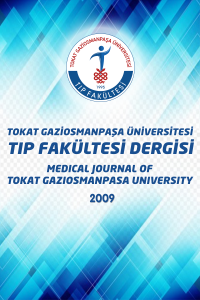İntrakranial Menenjiomlar: 41 Vakanın Analizi
Amaç: Kliniğimizdeki 2013-2018 yılları arasında intrakranial menenjiom tanısı almış 41
hasta retrospektif olarak incelendi. Olguların cinsiyet, tümör yerleşimleri, cerrahi olarak
rezeksiyon miktarları ve histopatolojik tanıları değerlendirildi.
Yöntem ve Gereç: Olguların tümör yerleşimleri radyolojik görüntüler incelenerek, cerrahi rezeksiyon miktarları Simpson sınıflamasına göre ve histopatolojik tiplerde WHO sınıflamasına göre değerlendirilmiştir.
Bulgular: Olguların 31 (%75,6)’i kadın, 10 (%24,4)’u erkekti. Yerleşim yerleri: konveksite 19 (%41,4), sfenoid kanat 7 (%17,1), falks 6 (%14,6) , tentorial 4 (%9,8), serebello-pontin köşe 2 (%4,9) ve olfaktör oluk 2 (%4,9) olarak tespit edildi. Rezeksiyon miktarları Simpson’a göre gradelendi ve 28 (%68,2)’inin grade 1,4 (%9,8)’ünün grade 2,9 (%22)’unun grade 4 olduğu gözlendi. Olguların histopatolojik tanıları ise %43,9’u meningotelyomatöz, %26,8 transisyonel, %14,7 fibroblastik, %7,4 atipik, %2,4 psammomatöz, %2,4 sekretuar, %2,4 miksoid tip olarak saptandı.
Sonuç: Menengiomalar benign ekstraaksiyel tümörlerdir. Menengioma tedavisinde karar
tümör büyüklüğü ve semptomlara bağlıdır. Semptomatik olduklarında total rezeksiyonla tam
kür sağlanabilir. Kavernöz sinüs gibi tehlikeli yerleşimli tümörlerde subtotal rezeksiyon
uygulanmakla birlikte, subtotal rezeksiyon ve/veya nükslerde radyoterapinin tedavide yeri
bulunmaktadır.
Anahtar Kelimeler:
İntrakranial menengiomlar, Lokalizasyon, Histopatoloji
Intracranial Meningiomas: Analysis of 41 Cases
Objectıve: 41 patients diagnosed with intracranial meningioma in our clinic between 2013 and 2018 were retrospectively analyzed. Gender, tumor location, amount of surgical resection, and histopathological diagnosis of the cases were evaluated.
Materıal and Methods: Tumor locations of the cases were evaluated by examining radiological images, surgical resection amounts were evaluated according to Simpson classification and WHO classification for histopathological types.
Results: 31 (75.6%) of the cases were female and 10 (24.4%) were male. Locations: convexity 19 (41.4%), sphenoid wing 7 (17.1%), falx 6 (14.6%), tentorial 4 (9.8%), cerebellopontine corner 2 (4.9%), and olfactory groove 2 (4.9%) detected. The amount of resection was graded according to Simpson, and it was observed that 28 (68.2%) were grade 1, 4 (9.8%) were grade 2, and 9 (22%) were grade 4. Histopathological diagnoses of the cases were meningotheliomatous in 43.9%, transitional type in 26.8%, fibroblastic in 14.7%, atypical in 7.4%, psammomatous in 2.4%, secretory type in 2.4%, myxoid type in 2.4%.
Conclusıon: Meningiomas are benign extraaxial tumors. The decision to treat meningioma depends on tumor size and symptoms. When they are symptomatic, complete cure can be achieved with total resection. Although subtotal resection is performed in dangerous localized tumors such as cavernous sinus, radiotherapy has a place in the treatment of subtotal resection and/or recurrences.
Keywords:
Keywords:
Intracranial meningiomas, Localization, Histopathology,
___
- 1. Cushing H. The meningiomas (dural endotheliomas): Their source and favored seats of origin: Brain. 1922; 45: 282-316.
- 2. Perry A, Louis DN, Scheithauer BW, Budka H, VonDeimling A. Meningiomas. Louis DN, Ohgaki H, Wiestler OD, Cavenee WK (eds), WHO classification of tumours of the central nervous system, Lyon: IARC Press. 2007; 164–72.
- 3. Rosenberg LA, Prayson RA, Lee J et al. Long-term experinece with World Health Organization grade III (malignant) meningiomas at a single institution. Int J Radiation Oncology Biol Phys 2010; 74(2): 427-32.
- 4. Vranic A, Popovic M, Cör A, Prestor B, Pizem J: Mitotic count, brain invasion and location are independent predictors of recurrence-free survival in primary atypical malignant meningiomas: A study of 86 cases. Neurosurgery 2010; 67: 1124-32.
- 5. Miller KD, Ostrom QT, Kruchko C et al. Brain and other central nervous system tumor statistics, 2021. CA Cancer J Clin 2021; 71: 381-406.
- 6. Alexiou GA, Markoula S, Gogoy P, Kyritsis AP. Genetic and molecular alterations in meningiomas. Clin Neurol Neurosurg 2010; 112: 261-7.
- 7. Spille DC, Sporns PB, Hess K, Stummer W, Brokinkel B. Prediction of High-grade histology and recurrence in meningiomas using routine preoperative magnetic resonance ımaging: A systematic review. World Neurosurg 2019; 128: 174-81.
- 8. Wiemels J, Wrensch M, Claus EB. Epidemiology and etiology of meningioma. J Neurooncol 2010; 99: 307- 14.
- 9. Buhl R, Nabavi A, Wolff S et al. MR spectroscopy in patients with intracranial meningiomas. Neurol Res. 2007; 29: 43-6.
- 10. Goldbrunner R, Minniti G, Preusser M et al. EANO guidelines for the diagnosis and treatment of meningiomas. Lancet Oncol 17:e383-391, 2016.
- 11. Bright R. Reports of Medical Cases, Selected with a View of İllustrating the Symptoms and Cure of the Disease by a reference to morbid anatomy. Vol 2. London: Longman, 1831: 342-7.
- 12. Louis DN, Perry A, Reifenberger G et al. The 2016 World Health Organization Classification of Tumors of the Central Nervous System: a summary. Acta Neuropathol 2016; 131: 803-20.
- 13. Bondy M, Ligon BL. Epidemiology and etiology of intracranial meningiomas: a review. J Neurooncol 1996; 29: 197-205.
- 14. Jaaskelainen J. Seemingly complete removal of histologically benign intracranial meningioma: late recurrence rate and factors predicting recurrence in 657 patients. A multivariate analysis. Surg Neurol 1986; 26: 461-9.
- 15. Saloner D, Uzelac A, Hetts S, Martin A, Dillon W. Modern meningioma imaging techniques. J Neurooncol 2010; 99: 333-40.
- 16. Nakasu S, Fukami T, Jito J, Nozaki K. Recurrence and regrowth of benign meningiomas. Brain Tumor Pathol 2009; 26: 69-72.
- 17. Kaba SE, DeMonte F, Bruner JM et al. The treatment of recurrent unresectable and malignant meningiomas with interferon alpha-2B. Neurosurgery 1997; 40: 271-5.
- 18. Paiva-Neto MA, Tella OI. Supra-orbital keyhole removal of anterior fossa and parasellar meningiomas. Arq Neuropsiquiatr 2010; 68: 418-23.
- ISSN: 1309-3320
- Başlangıç: 2009
- Yayıncı: Tokat Gaziosmanpaşa Üniversitesi
Sayıdaki Diğer Makaleler
İntrakranial Menenjiomlar: 41 Vakanın Analizi
Yasin TAŞKIN, Erol ÖKSÜZ, Fatih Ersay DENİZ
Pes Ekinovaruslu Olguların Ponseti Yöntemi İle Tedavi Sonuçları
Nazım AYTEKİN, Hayati ÖZTÜRK, Sezer ASTAN
Otoimmun Hastalıklarda Kişilik Özellikleri
Müberra KULU, Filiz ÖZSOY, Sevil OKAN
Romatoid Artritli Hastalarda Alkol Dışı Yağlı Karaciğer Hastalığı Sıklığı
Tavşan Vajinal Yara Modelinde Propolis Uygulamasının Yara İyileştirici Etkisi
Begüm KURT, Çaglar YILDIZ, Neşe KURT ÖZKAYA, Tülay KOÇ, Serkan ÇELİKGÜN
